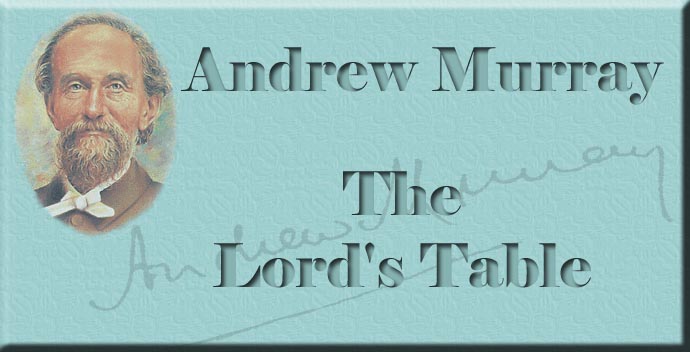
The Lord's Table
By Andrew Murray
Part 2 - Chapter 8
One Body
"We who are many are one body: for we all partake of the one bread." "A new commandment I give unto you, that ye love one another; even as I have loved you, that ye also love one another. By this shall all men know that ye are my disciples, if ye have love one to another." –1 Corinthians 10:17; John 13:34, 35.
 nion
with the Lord Jesus, the Head,
involves at the same time mutual
union with the members of the
body. He that really eats the
body of Jesus and drinks His
blood, is incorporated with His
body, and stands thenceforth in
the closest relationship to the
whole body, with all its
members. We have fellowship, not
only in His body which He gave
up to death, but especially in
His body which He brought again
from the dead–that is, the
Church. "We are one body; for we
all partake of the one bread." nion
with the Lord Jesus, the Head,
involves at the same time mutual
union with the members of the
body. He that really eats the
body of Jesus and drinks His
blood, is incorporated with His
body, and stands thenceforth in
the closest relationship to the
whole body, with all its
members. We have fellowship, not
only in His body which He gave
up to death, but especially in
His body which He brought again
from the dead–that is, the
Church. "We are one body; for we
all partake of the one bread."So deep and wonderful was this union of His believing disciples at the table of the New Covenant, so entirely new the life of the Spirit by which they were to be gathered together into one in Him as His body, that the Lord spoke of the love which must animate them as a new commandment. In the New Covenant there was present a new life, and thus also a new love. "By this shall all men know that ye are My disciples, if ye have love one to another." This thought is too much forgotten at the Lord's Table, and that to the great loss of the Church. How often have guests at Jesus' Table sat next [to] one another for years in concession without knowing or loving one another, without holding fellowship with one another, or helping one another. Many a one has sought after closer connection with the Lord and not found it, because they would have the Head alone without the body. Many a blessing has been missed and lost at the Supper, because the unity of the body was never considered. Yes: would that were it thoroughly understood; Jesus must be loved, and honored, and served, and known in His members. As by the circulation of the blood every member of our body is kept unceasingly in the most vital connection with the others, so the body of Christ can increase and become strong only when, in the loving interchange of the fellowship of the Spirit and of love, the life of the Head can flow unhindered from member to member. The observance of the Supper must be regarded as the conclusion of an alliance, not only with the Lord, but with all that sit at the table, to the effect that we shall live for one another. Not only must love to Him whose bread I eat be the object of desire, and promise, and prayer, but ,also His love to all who eat that bread along with me there. . Blessed Lord, grant unto me to feel this truth aright. As really as in this bread which Thou dost impart to me, I maintain fellowship with Thee, I maintain it also with those with whom I share the bread at the table. As I receive Thee, so do I receive them. As I desire to confess, and love, and serve Thee, so would I also them. As I would be wholly one with Thee, so would I also with them. Very humbly do I acknowledge before Thee the sins of my old nature–selfishness, lovelessness, envy, wrath) indifference about others. Boldly and trustfully I entreat Thee for the love, the gentleness, the mercy, that are in Thee, to be shed abroad also in me. O Jesus, who givest Thyself to me, work in me and with me in all who eat of this one bread with me, Thine own heavenly love. Amen.
|
|
 |
 |
|
|
|
Book Navigation
Title Page
Table of Contents
Part I
► The Week before the
Supper
► Sabbath Morning
► Monday Morning
► Tuesday Morning
► Wednesday Morning
► Thursday Morning
► Friday Morning
► Saturday Morning
► Saturday Evening
Part II
► The Communion
Sabbath
► Sabbath Morning
► Take, Eat
► In Remembrance of Me
► My Blood
► The New Covenant
► Unto Remission of
Sins
► For Many
► For You
► One Body
► The Cup of Blessing
► Till He Come
► Sabbath Evening
Part III
► The Week after the
Supper
► Monday Morning
► Tuesday Morning
► Wednesday Morning
► Thursday Morning
► Friday Morning
► Saturday Morning
Appendix
-
Site Navigation
 Home
Home What's New
What's New Bible
Bible Photos
Photos Hiking
Hiking E-Books
E-Books Genealogy
Genealogy Profile
Free Plug-ins You May Need
Profile
Free Plug-ins You May Need
 Get
Java
Get
Java.png) Get Flash
Get Flash Get
7-Zip
Get
7-Zip Get Acrobat Reader
Get Acrobat Reader Get
TheWORD
Get
TheWORD